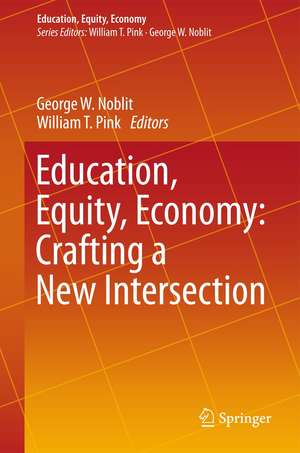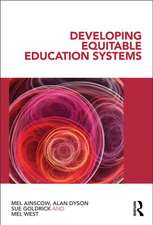Education, Equity, Economy: Crafting a New Intersection: Education, Equity, Economy, cartea 1
Editat de George W. Noblit, William T. Pinken Limba Engleză Hardback – 24 noi 2015
This first volume in the new book series not only introduces the series itself, but also several authors whose chapters that appear here presage the in-depth analysis that will be offered by their volumes in the series.
Education is invoked repeatedly in the ‘class warfare’ that pits the population against the elites as the investment that makes the difference, in terms of both policy and individual commitment, in the economy. The economy in this scenario is competitive, accumulative, exploitive and stratifying, implying education should mirror this and prepare people to fit this economy. However, educationhas other historic goals of developing common cultures, national identities, and civic engagement that belie this form of economic determinism. This volume and the series will explore this new nexus of economy and education with equity.
| Toate formatele și edițiile | Preț | Express |
|---|---|---|
| Paperback (1) | 638.24 lei 6-8 săpt. | |
| Springer International Publishing – 23 aug 2016 | 638.24 lei 6-8 săpt. | |
| Hardback (1) | 644.49 lei 6-8 săpt. | |
| Springer International Publishing – 24 noi 2015 | 644.49 lei 6-8 săpt. |
Preț: 644.49 lei
Preț vechi: 758.23 lei
-15% Nou
Puncte Express: 967
Preț estimativ în valută:
123.34€ • 128.29$ • 101.82£
123.34€ • 128.29$ • 101.82£
Carte tipărită la comandă
Livrare economică 14-28 aprilie
Preluare comenzi: 021 569.72.76
Specificații
ISBN-13: 9783319216430
ISBN-10: 3319216430
Pagini: 237
Ilustrații: XI, 237 p.
Dimensiuni: 155 x 235 x 22 mm
Greutate: 0.53 kg
Ediția:1st ed. 2016
Editura: Springer International Publishing
Colecția Springer
Seria Education, Equity, Economy
Locul publicării:Cham, Switzerland
ISBN-10: 3319216430
Pagini: 237
Ilustrații: XI, 237 p.
Dimensiuni: 155 x 235 x 22 mm
Greutate: 0.53 kg
Ediția:1st ed. 2016
Editura: Springer International Publishing
Colecția Springer
Seria Education, Equity, Economy
Locul publicării:Cham, Switzerland
Public țintă
ResearchCuprins
Introduction: Making it Different: Education, Equity, Economy by George W. Noblit & William T. Pink.- Part I: Recognition.- Nourishing Learning, Nurturing Culture, Cultivating Justice by Francesca Gobbo.- Re-thinking Teacher Quality in High Poverty Schools in Australia by Bruce Burnett & Jo Lampert.- Recognizing and Controlling the Social Costs of Parental School Choice by Janne Varjo, Mira Kalalahti & Lisbeth Lundahl.- Part II: Critique.- “It’s Almost Like We Were Sold.”: Burundians with Refugee Status and Educational and Economic Inequity in the U.S. by Allison Daniel Anders.- Same Monster Different Mask: How Neoliberal Market Principles Changed public Schools and Established White Domination of Public Education in New Orleans by Daniella Ann Cook.- Repositioning Disability in the Discourse of Our Times: A Study of the Everyday Lives of Children with Autism by Jessica Nina Lester & Michelle O’Reilly.- Native and Indigenous Education in the Americas: Indigenous Knowledge Systems, Equity, and Economies by Luis Urrieta Jr..- Part III: Possibility.- School Math: From Algorithms and Conceptual Understanding to Democracy and Opportunity by Kurt Stemhagen.- Youth Techtual Economies: The Paradox and Purchase of Equity by Jon M. Wargo.- Protection Versus Project: Italian Humanitarian Interventions Towards Refugees as a Challenge to Equity by Chiara Dallavalle.
Textul de pe ultima copertă
This volume will introduce the readers to an alternative nexus of education, equity and economy, pointing to economies and educations that promote a less stratified and exploitive world, and as the chapter authors demonstrate, this view has a wide range of applications, from technology, mathematics, to environmental catastrophes and indigenous cultures.
This first volume in the new book series not only introduces the series itself, but also several authors whose chapters that appear here presage the in-depth analysis that will be offered by their volumes in the series.
Education is invoked repeatedly in the ‘class warfare’ that pits the population against the elites as the investment that makes the difference, in terms of both policy and individual commitment, in the economy. The economy in this scenario is competitive, accumulative, exploitive and stratifying, implying education should mirror this, and prepare people to fit this economy. However, education has other historic goals of developing common cultures, national identities, and civic engagement that belie this form of economic determinism. This volume and the series will explore this new nexus of economy and education with equity.
This first volume in the new book series not only introduces the series itself, but also several authors whose chapters that appear here presage the in-depth analysis that will be offered by their volumes in the series.
Education is invoked repeatedly in the ‘class warfare’ that pits the population against the elites as the investment that makes the difference, in terms of both policy and individual commitment, in the economy. The economy in this scenario is competitive, accumulative, exploitive and stratifying, implying education should mirror this, and prepare people to fit this economy. However, education has other historic goals of developing common cultures, national identities, and civic engagement that belie this form of economic determinism. This volume and the series will explore this new nexus of economy and education with equity.
Caracteristici
Introduces a book series that explores the new nexus of education, equity and economy Provides a new analytic standpoint, the conjunction of education, equity and economy, for research and scholarship Gives a different view of economy that emphases its role in producing more equitable and sustainable societies
























